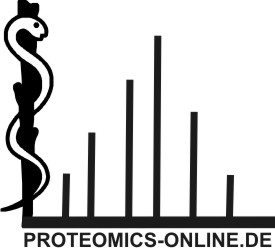
Home
Research
Methods
Members
Publications
Contact
Disclaimer
© Proteomics-online.de
Proteomics
The term "proteome" was
introduced by Williams and Wilkins in 1995 as the entirety of all
proteins encoded by a genome expressed in a certain organ or cell type
at a given state. Thus, the proteome is a highly dynamic entity
influenced by many intrinsic and extrinsic factors such as the genome,
interactions, drugs, etc.
Besides the qualitative and quantitative description of the expressed
proteins proteomics also deals with the analysis of the mutual
interactions of the proteins. Therefore, the "classical" proteomics
approach compares two different states of a proteome, e.g. healthy -
diseased or drug-treated - untreated. Such differential analyses yield
a quantitative comparison of the expressed protein patterns and
facilitate conclusions on direct or indirect interactions of the
altered parameters. Thereby, "candidate proteins" can be identified
which maybe used as starting-points for diagnostic or even theraupeutic
approaches.